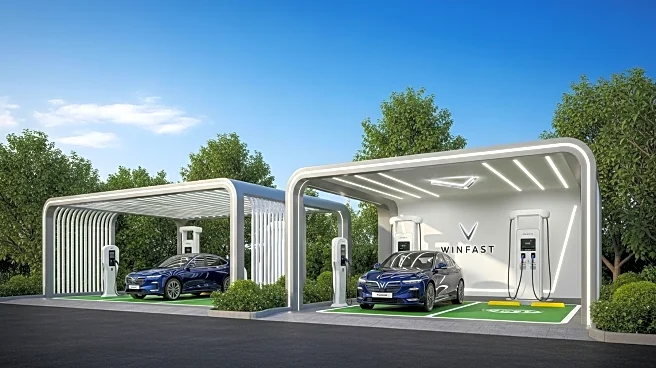What's Happening?
Vietnamese automaker VinFast has made a strategic entry into India's electric vehicle (EV) market, investing $2 billion in a Tamil Nadu-based assembly plant. This facility is set to produce 50,000 units annually, with plans to scale up to 150,000 units. VinFast's approach includes localized manufacturing to avoid high import duties, which have affected competitors like Tesla. The company is introducing premium SUVs, VF6 and VF7, priced between ₹16.49 lakh and ₹25.49 lakh, featuring advanced technology such as vegan leather interiors and Level 2 ADAS. VinFast is also building an EV ecosystem through partnerships with myTVS for service workshops and RoadGrid and BatX Energies for charging infrastructure and battery recycling.
Why It's Important?
VinFast's entry into the Indian market is significant as it challenges established players like Tata Motors and Mahindra, and premium brands like Tesla. By localizing production, VinFast aligns with India's 'Make in India' initiative, potentially reducing costs and increasing competitiveness. The company's focus on premium features at competitive prices targets urban, tech-savvy consumers, offering an alternative to both local and global brands. This move could disrupt the market dynamics, especially as India pushes for increased EV adoption through government incentives and infrastructure development.
What's Next?
VinFast plans to expand its retail presence with 35 showrooms and 32 dealerships by 2025, aiming to replicate the distribution networks of local competitors. The company must navigate brand recognition challenges and operational risks associated with its partnerships for infrastructure and services. Success in these areas could position VinFast as a key player in India's rapidly growing EV market, potentially influencing regional export strategies.
Beyond the Headlines
VinFast's strategy highlights the broader trend of international automakers investing in localized production to tap into emerging markets. The company's focus on sustainability and advanced technology reflects a shift towards environmentally conscious consumer preferences. This development may encourage other global brands to consider similar approaches, impacting the competitive landscape and driving innovation in the EV sector.










